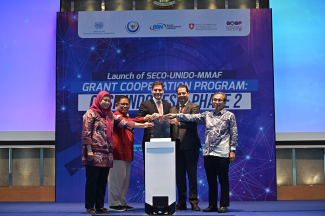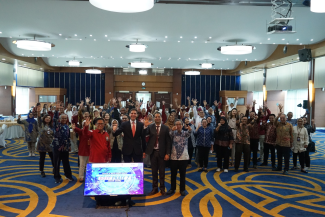GQSP Indonesia Phase 2 Launched
The Global Quality and Standards Programme (GQSP) Indonesia Phase 2 has been officially launched on Tuesday 15/8, at the Ministry of Marine Affairs and Fisheries (MMAF), Jakarta. The launch, jointly organized by UNIDO and MMAF, attended by around 200 delegates (offline and online) from various representatives of national and regional government ministries/agencies, fisheries associations, the programme’s partners, NGOs and other stakeholders. The head of SECO Indonesia of the Switzerland Embassy in Jakarta, Mr. Philipp Orga, Director of Fisheries Product and Quality Development of MMAF, Mr. Widya Rustyanto, Director of Strengthening Standards Implementation and Conformity Assessment of National Standardization Agency (BSN), Ms. Triningsih Herlinawati, Mr. Salil Dutt of UNIDO Office in Jakarta and Mr. Sudari Pawiro, NCTA of GQSP Indonesia, jointly pressed button commemorating the launch of the GQSP Phase 2 in Indonesia.
During the launch, the results of the GQSP Phase 1 were presented and all the supporting documents were handed over to all partners. A day earlier on 14/8, the final (8th) Steering Committee Meeting (SCM) of GQSP Indonesia Phase 1 (2019-2023) was organized at MMAF, to officially conclude the programme. During the SCM, the Project Document (Prodoc) of the new GQSP Phase 2 was jointly signed by Director General of Product Competitiveness of the MMAF, Mr. Budi Sulistiyo, Mr. Salil Dutt of UNIDO and Mr. Philipp Orga of SECO, Indonesia.
The GQSP Indonesia Phase 2 will cover three aquaculture value chains namely Shrimp, Milkfish and Seaweeds focusing on improving productivity and quality of shrimp and milkfish from traditional/extensive farming system integrated with mangrove rehabilitation in selected locations. Special emphasize to be given on the development of new species of seaweeds for improving livelihood of coastal communities and increase contribution of seaweeds to climate change mitigation and adaptation. The new programme runs from October 2023-Dec 2026 (39 months) with three months inception phase the last quarter of the year, followed by full implementation of the programme’s activities in January 2024.


